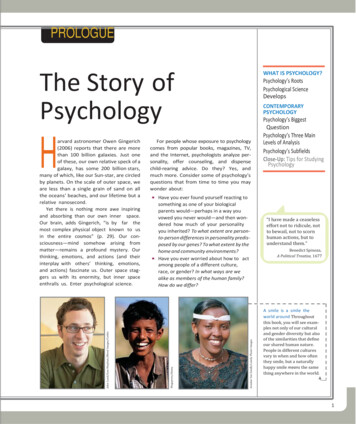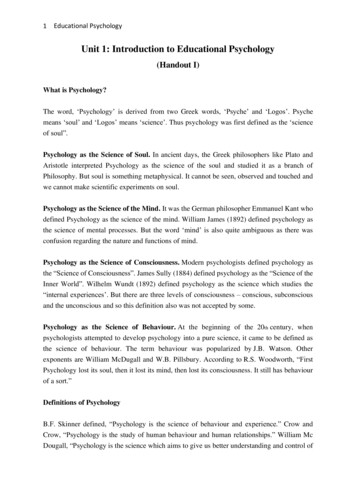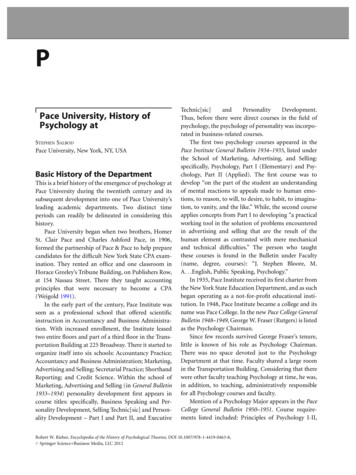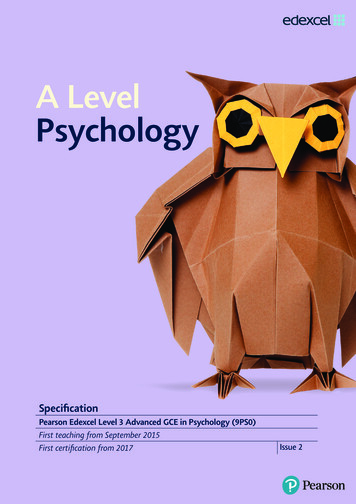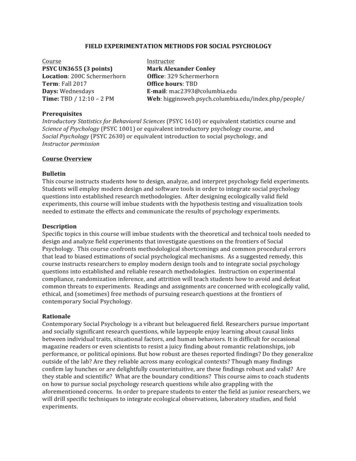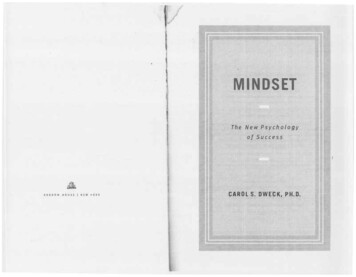
Transcription
1.IMINDSET!I;!IThe New Psychologyof SuccessRANDOMHOUSEINEWYORKCAROLS. DWECK, PH.D.', I·A11 r-1rI
COPYRIGHT :wo6CONTENTSBY CAROLS. DWECK, PH.D.All rights reserved.Published in the United S(lltes by Random House,an imprint of The Random HousePublishing Group,a division of Random House, Inc., New York.RANDOMIntroductionHousE and colophon a r e r egisreredrxmdemarks of Random House, Inc.Grateful acknowledgment is madetoJeremy P.T:m:her, an imprint1. THE MINDSETSofPengujn Group {USA), for permissio n to reprint four illustrations from pp. r8-r9of TIN NDrawingon the Right Side ofthe Brain WorkD()()k by Betty Edwards,copyright Q 1003 by Berty Edwards. Reprinted by permission ofJeremy P. Tarcher, an imprint ofPenguin Group {USA).LIBRARY OF CONGRESS CATALOCIJIIC-1111-PUBLICATION DATADweck, Carol S.Mindset: the new psychology of success I Carol S. Dweck-rst ed.p.em.Includes index.ISBN r-4ooo-6z7s-6 (alk. paper)r. Belief and doubt. z. Success-P ychological aspects.I. Title.BF773.Dss zoo6Why Do People Diffu ?What Does All This Meanfor You? The Two Mindsets7 A Viewfrom the 'Pwo Mindsets9 So, Whats New?rrSe!f-Insight: Who Has Accurate ViewsofTheir Assets and Limitations?Whats in StoreII462. INSIDE THE MINDSETSr6Printtd in the Unittd States ofAmmta on atid-Jrupaperwww.atrandom.comI 3I 15Is Success About Learning-Or PrO'Ving You're Smart?Mindsets Change the Meaning ofFailure39 Mindsets Change the Meaning ofEffort45 Questions and Answers323. THE TRUTH ABOUT ABILITY AND ACCOMPLISHMENTMindset and School Achievement67 Is Artistic Ability a Gift?7I The Danger ofPraise and Positive Labels74 Nej{ative Labels and How ThPV Wnr.b57I 55
t i ICONTENTSCONTENTS4. SPORTS: THE MINOSET OF A CHAMPION7. PARENTS, TEACHERS, AND COACHES:I 82WHERE DO MINDSETS COME FROM?I 1688]The Idea of the Natural9I"Character"98What Is Success?99What Is Failure?IOITaking Charge ofSuccessIOJWhat Does It Mean to Be a Star?196Coaches: Winning Through Mindset105Hearing the Mindsets204Our Legacy5. BUSINESS: MINDSET AND LEADERSHIP169Parents {and Teachers): Messages About Successand Failure187Teachers (and Parents): What Makes a Great Teacher{or Parent)?8. CHANGING MINDSETS: A WORKSHOPI 108I 207108Enron and the Talent Mindset207The Nature ofChange109Organizations That Grow210The Mindset LecturesIIIA Study ofMindset and Management Decisions212A Mindset Workshop112Leadership and the Fixed Mindset215Brainology114Fixed-Mindset Leaders in Action218More About Change124Growth-Mindset Leaders in Action220Taking the First Step: A Workshopfor YouIJJA Study ofGroup Processes224People Who Don't Want to Change134Groupthink Versus We Think228Changing Your Child's MindsetAre Leaders Born or Made?2JJMindset and Willpower2]6Maintaining Change2J9The Road Ahead241Notes1366. RELATIONSHIPS: MINDSETS IN LOVE (OR NOT)142Relationships Are Different14]Mindsets Falling in Love152The Partner as EnemyISJCompetition: Whos the Greatest?154Developing in RelationshipsISSFriendship158Shyness16oBullies and Victims: Revenge RevisitedI 1 39265Recomme11dtd Books267IndexI 1Jii
ChapterITHE MINDSETSWhen I was a young researcher, just starting out, something hap pened that changed my life. I was obsessed with understanding howpeople cope with failures, and I decided to study it by watching how stu dents grapple with hard problems. So I brought children one at a time toa room in their school, made them comfortable, and then gave them aseries of puzzles to solve. The first ones were fairly easy, but the next oneswere hard. As the students grunted, perspired, and toiled, I watchedtheir strategies and probed what they were thinking and feeling. I ex pected differences among children in how they coped with the difficulty,but I saw something I never expected.Confronted with the hard puzzles, one ten-year-old boy pulled uphis chair, rubbed his hands together, smacked his lips, and cried out, "Ilove a challenge!" Another, sweating away on these puzzles, looked upwith a pleased expression and said with authority, "You know, I was hop ing this would be informative!"Whats wrong with them? I wondered.I always thought you copedwith failure or you didn't cope with failure. I never thought anyone lovedfailure. Were these alien children or were they on to something?Everyone has a role model, someone who pointed the way a t a criti cal moment in their lives. These children were my role models. They ob viously knew something I didn't and I was determined to figure it
4THE MINDS TS II MINDSETsout-to understand the kind of mindset that could turn a failure into atest. Wasn't the IQtest meant to summarize children's unchangeable in gift.telligence? In fact, no. Binet, a Frenchman working in Paris in the earlyWhat did they know? They knew that human qualities, such as intel twentieth century, designed this test to identify children who were notlectual skills, could be cultivated through effort. And that's what they were.doing-getting smarter. Not only weren't they discouraged by failure,profiting from the Paris public schools, so that new educational programscould be designed to get them back on track. Without denying individualthey didn't even think they were failing. They thought they were learning.differences in children's intellects, he believed that education and prac I, on the other hand, thought human qualities were carved in stone.tice could bring about fundamental changes in intelligence. Here is aYou were smart or you weren't, and failure meant you weren't. It was thatquote from one of his major books, Modern Ideas About Children, insimple. If you could arrange successes and avoid failures (at all costs), youwhich he summarizes his work with hundreds of children witp learningcould stay smart. Struggles, mistakes, perseverance were just not part ofdifficulties:this picture.Whether human qualities are things that can be cultivated or thingsA few modern philosophers . assert that an individual's intelli that are carved in stone is an old issue. What these beliefs mean for yougence is a ftXed quantity, a quantity which cannot be increased.is a new one: What are the consequences of thinking that your intelli We must protest and react against this brutal pessimism.gence or personality is something you can develop, as opposed to some With practice, training, and above all, method, we manage to in thing that is a ftXed, deep-seated trait? Let's first look in on the age-old,crease our attention, our memory, our judgment and literally tofiercely waged debate about human nature and then return to the ques become more intelligent than we were before.tion of what these beliefs mean for you.Who's right? Today most experts agree that it's not either-or. It's notWHY DO PEOPLE DIFFER?nature or nurture, genes or environment. From conception on, there's aconstant give and take between the two. In fact, as Gilbert Gottlieb, anSince the dawn of time, people have thought differendy, acted differ eminent neuroscientist, put it, not only do genes and environment coop cody, and fared differendy from each other. It was guaranteed thaterate as we develop, but genes require input from the environment tosomeone would ask the question of why people differed-why somework properly.peoplearesmarter or more moral-and whether there was somethingAt the same time, scientists are learning that people have more ca that made them permanendy different. Experts lined up on both sides.pacity for lifelong learning and brain development than they everSome claimed that there was a strong physical basis for these differ thought. Of course, each person has a unique genetic endowment. Peo ences, making them unavoidable and unalterable. Through the ages,ple may start with different temperaments and different aptitudes, but itthese alleged physical differences have included bumps on the skullis clear that experience, training, and personal effort take them the rest(phrenology), the size and shape of the skull (craniology), and, today,of the way. Robert Sternberg, the present-day guru of intelligence, writesgenes.that the major factor in whether people achieve expertise "is not someOthers pointed to the strong differences in people's backgrounds, ex ftXed prior ability, but purposeful engagement." Or, as his forerunnerperiences, training, or ways of learning.It may surprise you to know thatBinet recognized, it's not always the people who start out the smartesta big champion of this view was Alfred Binet, the inventor of the IQwho end up the smartest.
THE MINUSETS I6 I MINOSETWHAT DOES ALL THIS MEAN FOR YOU? THE TWO MINDSETSIt's one thing to have pundits spouting their opinions about scientific is sues. It's another thing to understand how these views apply to you. Fortwenty years, my research has shown that the view you adoptfor yourselfprofoundly affects the way you lead your life. It can determine whetheryou become the person you want to be and whether you accomplish thethings you value. How does this happen? How can a simple belief havethe power to transform your psychology and, as a result, your life?Believing that your qualities are carved in stone-thefixed mindset creates an urgency to prove yourself over and over. If you have only a cer tain amount of intelligence, a certain personality, and a certain moralcharacter-well, then you'd better prove that you have a healthy dose ofthem. It simply wouldn't do to look or feel deficient in these most basiccharacteristics.Some of us are trained in this mindset from an early age. Even as achild, I was focused on being smart, but the fixed mindset was reallystamped in by Mrs. Wilson, my sixth-grade teacher. Unlike AlfredBinet, she believed that people's IQscores told the whole story of whothey were. We were seated around the room in IQorder, and only thehighest-IQstudents could be trusted to carry the flag, clap the erasers,or take a note to the principal. Aside from the daily stomachaches sheprovoked with her judgmental stance, she was creating a mindset inwhich everyone in the class had one consuming goal-look smart, don'tlook dumb. Who cared about or enjoyed learning when our whole beingwas at stake every time she gave us a test or called on us in class?I've seen so many people with this one consuming goal of provingthemselves-in the classroom, in their careers, and in their relationships.Every situation calls for a confirmation of their intelligence, personality, orcharacter. Every situation is evaluated: WillI succeed orfail? WillIlook smartor dumb? Will I be accepted or rejected? WillIfeel/ike a winner or a loser?But doesn't our society value intelligence, personality, and character?Isn't it normal to want these traits? Yes, but .There's another mindset in which these traits are not simply a hand7you're dealt and have to live with, always trying to convince yourself andothers that you have a royal flush when you're secretly worried it's a pairof tens. In this mindset, the hand you're dealt is just the starting point fordevelopment. This growth mindset is based on the belief that your basicqualities are things you can cultivate through your efforts. Althoughpeople may differ in every which way-in their initial talents and apti tudes, interests, or temperaments-everyone can change and growthrough application and experience.Do people with this mindset believe that anyone can be anything,that anyone with proper motivation or education can become Einsteinor Beethoven? No, but they believe that a person's true potential is un known (and unknowable); that it's impossible to foresee what can be ac complished with years of passion, toil, and training.Did you know that Darwin and Tolstoy were considered ordinarychildren? That Ben Hogan, one of the greatest golfers of all time, wascompletely uncoordinated and graceless as a child? That the photogra pher Cindy Sherman, who has been on virtually every list of the mostimportant artists of the twentieth century,foiled her first photographycourse? That Geraldine Page, one of our greatest actresses, was advisedto give it up for lack of talent?You can see how the belief that cherished qualities can be developedcreates a passion for learning. Why waste time proving over and overhow great you are, when you could be getting better? Why hide deficien cies instead of overcoming them? Why look for friends or partners whowill just shore up your self-esteem instead of ones who will also chal lenge you to grow? And why seek out the tried and true, instead of expe riences that will stretch you? The passion for stretching yourself andsticking to it, even (or especially) when it's not going well, is the hall mark of the growth mindset. This is the mindset that allows people tothrive during some of the most challenging times in their lives.A VIEW FROM THE TWO MINDSETSTo give you a better sense of how the two mindsets work, imagine-asvividly as you can-that you are a young adult having a really bad day:
8THE MINDSETSI MINDS TI9One day, you go to a class that is really important to you and thatfrom this raw material the fiXed mindset created the feeling of utter fail you like a lot. The professor returns the midterm papers to theure and paralysis.class. You got a C . You're very disappointed. That evening onthe way back to your home, you find that you've gotten a parkingticket. Being really frustrated, you call your best friend to shareyour experience but are sort of brushed off.When I gave people with the growth mindset the same vignette,here's what they said. They'd think:"I need to try harder in class, be more careful when parking thecar,and wonder if my friend had a bad day.""The C would tell me that I'd have to work a lot harder in the class,What would you think? What would you feel? What would you do?When I asked people with the fiXed mindset, this is what they said:"I'd feel like a reject.""I'm a total failure." "I'm an idiot.""I'm a loser.""I'dbut I have the rest of the semester to pull up my grade."There were many, many more like this, but I think you get the idea.Now, how would they cope? Directly.feel worthless and dumb--everyone's better than me." "I'm slime." In"I'd start thinking about studying harder (or studying in a differentother words, they'd see what happened as a direct measure of their com way) for my next test in that class, I'd pay the ticket, and I'd work thingspetence and worth.out with my best friend the next time we speak."Th s is what they'd think about their lives: "My life is pitiful." "I have"I'd look at what was wrong on my exam, resolve to do better, pay myno life." "Somebody upstairs doesn't like me." "The world is out to getparking ticket, and call my friend to tell her I was upset the day before."me." "Someone is out to destroy me." "Nobody loves me, everybody"Work hard on my next paper, speak to the teacher, be more carefulhates me.""Life is unfair and all efforts are useless.""Life stinks. I'm stu where I park or contest the ticket, and find out what's wrong with mypid. Nothing good ever happens to me." "I'm the most unlucky personfriend."on this earth."Excuse me, was there death and destruction, or just a grade, a ticket,and a bad phone call?You don't have to have one mindset or the other to be upset. Whowouldn't be? Things like a poor grade or a rebuff from a friend or loved one--these are not fun events. No one was smacking their lips with rel Aie these just people with low self-esteem? Or card-carrying pes ish. Yet those people with the growth mindset were not labeling them simists? No. When they aren't coping with failure, they feel just as wor selves and throwing up their hands. Even though they felt distressed,thy and optimistic-and bright and attractive-as people with thethey were ready to take the risks, confront the challenges, and keepgrowth mindset.working at them.So how would they cope? "I wouldn't bother to put so much time andeffort into doing well in anything." (In other words, don't let anyoneSO, WHAT'S NEW?measure you again.) "Do nothing." "Stay in bed." "Get drunk." "Eat.""Yell at someone if I get a chance to.""Eat chocolate.""Listen to musicIs this such a novel idea? We have lots of sayings that stress the impor and pout." "Go into my closet and sit there." "Pick a fight with some tance of risk and the power of persistence, such as "Nothing ventured,body." "Cry." "Break something.""What is there to do?"nothing gained" and "If at first you don't succeed, try, try again" orWhat is there to do! You know, when I wrote the vignette, I intention "Rome wasn't built in a day." (By the way, I was delighted to learn thatally made the grade a C , not an F. It was a midterm rather than a final.the Italians have the same expression.) What is truly amazing is thatIt was a parking ticket, not a car wreck. They were "sort of brushed off,"people with the fixed mindset would not agree. For them, it's "Nothingnot rejected outright. Nothing catastrophic or irreversible happened. Yetventured, nothing lost." "If at fust you don't succeed, you probably don't
JOI MINOSt:TTHE Ml:-IOStTShave the ability." "If Rome wasn't built in a day, maybe it wasn't meant tothinking into practice for themselvesbe." In other words, risk and effort are two things that might reveal yourme to transform my work with children and see education through a cinadequacies and show that you were not up to the task. In fact, it's star ferent lens," or "I just wanted to let you know what an impact-o1tling to see the degree to which people with the ftXed mindset do not be personal and practical level-your outstanding research has had for htlieve in effort.dreds of students."and others: "Your work has allovWhat's also new is that people's ideas about risk and effort grow outof their more basic mindset. It's not just that some people happen to rec SELF-INSIGHT: WHO HAS ACCURATE VIEWSognize the value of challenging themselves and the importance of effort.OF THEIR ASSETS AND LIMITATIONS?Our research has shown that this comts dimtly from the growth rnindset.When we teach people the growth mindset, with its focus on develop Well, maybe the people with the growth mindset don't think theyment, these ideas about challenge and effort follow. Similarly, it's not justEinstein or Beethoven, but aren't they more likely to have inflated vie'that some people happen to dislike challenge and effort. When we (tem of their abilities and try for things they're not capable of? In fact, stuporarily) put people in a ftXed mindset, with its focus on permanenties show that people are terrible at estimating their abilities. Recently,\traits, they quickly fear challenge and devalue effort.set out to see who is most likely to do this. Sure, we found that peopWe often see books with titles like The Ten Secrets ofthe World's MostSuccessful People crowding the shelves of bookstores, and these books maygreatly misestimated their performance and their ability.But it was the.with thefixed mindset who accountedfor almost all the inaccuracy. The pe give many useful tips. But they're usually a list of unconnected pointers,ple with the growth mindset were amazingly accurate.like "Take more risks!" or "Believe in yourself!" While you're left admir When you think about it, this makes sense. If, like those with ding people who can do that, it's never clear how these things fit togethergrowth mindset, you believe you can develop yourself, then you're opeor how you could ever become that way. So you're inspired for a few days,to accurate information about your current abilities, even ifit's unflatte1but basically the world's most successful people still have their secrets.ing. What's more, ifyou're oriented toward learning, as they are, you netInstead, as you begin to understand the fixed and growth rnindsets,accurate information about your current abilities in order to learn effecyou will see exactly how one thing leads to another-how a belief thattively.your qualities are carved in stone leads to a host of thoughts and actions,your precious traits-as it is with fixed-mindset people--distortion alHowever, if everything is either good news or bad new·s abouand how a belief that your qualities can be cultivated leads to a host ofmost inevitably enters the picture. Some outcomes are magnified, otherdifferent thoughts and actions, taking you down an entirely differentareexplained away, and before you know it you don't know yourself at allroad. It's what we psychologists call an Aha.' experience. Not only have IHoward Gardner, in his book Extraordinary Minds, concluded thaseen this in my research when we teach people a new mindset, but I getexceptional individuals have "a special talent for identifying their ow1letters all the time from people who have read my work.strengths and weaknesses." It's interesting that those with the growtlThey recognize themselves: "As I read your article I literally foundmindset seem to have that talent.myself saying over and over again, 'This is me, this is me!' "They see theconnections: "Your article completely blew me away. I felt I had discov ered the secret of the universe!" They feel their mindsets reorienting: "IWHAT'S IN STOREcan certainly report a kind of personal revolution happening in my ownThe other thing exceptional people seem to have is a special talent forthinking, and this is an exciting feeling." And they can put this newconverting life's setbacks into future successes. Creativitv researrhPrc: rnn-
nTHE MINDS TS II MINDS Tcur. In a poll of 143 creativity researchers, there was wide agreement aboutthe number one ingredient in creative achievement. And it was exactlyIt's not only your abilities; it's your personal qualities too.the kind of perseverance and resilience produced by the growth mindset.Look at these statements about personality and character and de You may be asking again, How can one belieflead to all this-the love ofcide whether you mostly agree or mostly disagree with each one.challenge, beliefin effort, resilience in theface of setbacks, and greater (morecreative!) success? In the chapters that follow, you'll see exactly how this1.happens: how the mindsets change what people strive for and what theythat can be done to really change that.see as success. How they change the definition, significance, and impact2.of failure. And how they change the deepest meaning of effort. You'll seechange substantially.how these rnindsets play out in school, in sports, in the workplace, and3.in relationships. You'll see where they come from and how they can bewho you are can't really be changed.changed.4.You are a certain kind of person, and there is not muchNo matter what kind of person you are, you can alwaysYou can do things differently, but the important parts ofYou can always change basic things about the kind ofperson you are.Grow Your MindsetHere, questionsWhich mindset do you have? Answer these questions about in questionstelligence. Read each statement and decide whether you mostlyagree with more?agree with it or disagree with it.2and4rand 3 are the ftxed-mindset questions andreflect the growth mindset. Which did youDid it differ from your intelligence mindset? It can. Your "in telligence mindset" comes into play when situations involve men t.Your intelligence is something very basic about you thattal ability.you can't change very much.2.Your "personality mindset" comes into play in situations thatYou can learn new things, but you can't really change howcooperative, caring, or socially skilled you are. The fixed mindsetintelligent you are.3.No matter how much intelligence you have, you canmakes you concerned with how you'll be judged; the growthmindset makes you concerned with improving.always change it quite a bit.4.involve your personal qualities-for example, how dependable,Here are some more ways to think about mindsets:You can always substantially change how intelligent youare. estions 3mindset. Think about how they're always trying to provereflect the growth mindset. Which mindset did you agreethemselves and how they're supersensitive about being wrongestionsand4xand2are the flxed-mindset questions.Think about someone you know who is steeped in the fJXedwith more? You can be a mixture, but most people lean towardor making mistakes. Did you ever wonder why they were thisone or the other.way? (Are you this way?) Now you can begin to w1derstandYou also have beliefs about other abilities. You could substi tute "artistic talent," "sports ability;' or "business skill'' for "intelli gence."Try it.why. Think about someone you know who is skilled in the growthmindset-someone who understands that important qualitiesIJ
III MIJio'DSI!Tcan be cultivated. Think about the ways they confront obsta cles. Think about the things they do to stretch themselves.What are some ways you might like to change or stretch your self? Okay, now imagine you've decided to learn a new language andyou've signed up for a class. A few sessions into the course, theChapterinstructor calls you to the front of the room and starts throw ing questions at you one after another.Put yourself in a ftXed mindset. Your ability is on the line.JINSIDE THE MINDSETSCan you feel everyone's eyes on you? Can you see the instruc tor's face evaluating you? Feel the tension, feel your ego bristleand waver. What else are you thinking and feeling?Now put yourself in a growth mindset. You're a novice hen I was a young woman, I wanted a prince-like mate. Verthat's why you're here. You're here to learn. The teacher is a re handsome, very successful. A big cheese. I wanted a glamorous carcesource for learning. Feel the tension leave you; feel your mindbut nothing too hard or risky. And I wanted it all to come to me as valiopen up.dation of who I was.The message is: You can change your mindset.It would be many years before I was satisfied. I got a great guy, but hwas a work in progress. I have a great career, but boy, is it a constant challenge. Nothing was easy. So why am I satisfied? I changed my mindsetI changed it because of my work. One day my doctoral student, MarBandura, and I were trying to understand why some students were scaught up in proving their ability, while others could just let go anlearn. Suddenly we realized that there were two meanings to ability, ncone: a fixed ability that needs to be proven, and a changeable ability thacan be developed through learning.That's how the mindsets were born. I knew instantly which onehad. I realized why I'd always been so concerned about mistakes and failures. And I recognized for the first time that I had a choice.When you enter a mindset, you enter a new world. In one world-thworld of fixed traits-success is about proving you're smart or talentecValidating yourself. In the other-the world of changing qualities-it'about stretching yourself to learn something new. Developing yourself.In one world, failure is about having a setback. Getting a bad grad
INSIDE THE M I N DSETS Ir6 I M I NDSETI7not smart or talented.In the other world, failure is about not growing.me this, lady? Why would anyone want to keep doing the same puzzle overand over? They chose one hard one after another.''I'm dying to figureNot reaching for the things you value. It means you're not fulfilling yourthem out!" exclaimed one little girl.Losing a tournament. Getting fired. Getting rejected. It means you'repotential.So children with the ftxed mindset want to make sure they succeed.In one world, effort is a bad thing. It, like failure, means you're notSmart people should always succeed. But for children with the growthsmart or talented. If you were, you wouldn't need effort. In the othermindset, success is about stretching themselves. It's about becomingworld, effort is what malus you smart or talented.smarter.You have a choice. Mindsets are just beliefs.They're powerful beliefs,One seventh-grade girl summed it up. "I think intelligence is some but they're just something in your mind, and you can change your mind.thing you have to work for . it isn't just given to you . Most kids, ifAs you read, think about where you'd like to go and which rnindset willthey're not sure of an answer, will not raise their hand to answer thetake you there.question. But what I usually do is raise my hand, because if I'm wrong,IS SUCCESS ABOUT LEARNING-OR PROVING YOU'RE SMART?then my mistake will be corrected. Or I will raise my hand and say, 'Howwould this be solved?' or 'I don't get this. Can you help me?' Just by doingthat I'm increasing my intelligence."Benjamin Barber, an eminent sociologist, once said, "I don't divide theworld into the weak and the strong, or the successes and the failures.I divideBeyond Puzzlesthe world into the learners and non/earners."What on earth would make someone a nonlearner? Everyone is bornIt's one thing to pass up a puzzle. It's another to pass up an opportunitywith an intense drive to learn. Infants stretch their skills daily.Not justthat's important to your future. To see ifthis would happen, we took ad ordinary skills, but the most difficult tasks of a lifetime, like learning tovantage of an unusual situation. At the University of Hong Kong, every walk and talk.They never decide it's too hard or not worth the effort.thing is in English.Classes are in English, textbooks are in English, andBabies don't worry about making mistakes or humiliating themselves.exams are in English.But some students who enter the university are notThey walk, they fall, they get up.They just barge forward.fluent in English, so it would make sense for them to do somethingWhat could put an end to this exuberant learning? The fixed mind about it in a hurry.set. As soon as children become able to evaluate themselves, some ofAs students arrived to register for their freshman year, we knewthem become afraid of challenges. They become afraid of not beingwhich ones were not skilled in English. And we asked them a key ques smart. I have studied thousands of people from preschoolers on, and it'stion: If the faculty offered a course for students who need to improvebreathtaking how many reject an
1 . -! I I I I , I·A 1 1 r-1 r MINDSET The New Psychology of Success RAND


